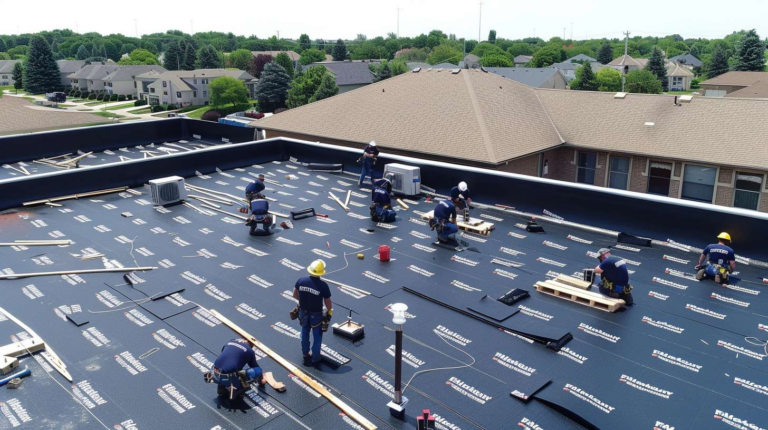Expert Flat Roof Surface Cracking Issues Repair Solutions
After twenty-three years working flat roofs across Queens, I can tell you that flat roof surface cracking is one of those issues that'll sneak up on you faster than a summer thunderstorm over Flushing Meadows. The repair costs typically run anywhere from $450 to $2,800 depending on how bad the cracking has gotten and what type of membrane you're dealing with. Small localized cracks might only set you back four to six hundred dollars, but extensive cracking across multiple sections? You're looking at major repair work that can easily hit the higher end of that range.
Look, I've seen everything from hairline stress fractures on a brand new EPDM installation in Astoria to massive alligatoring on thirty-year-old modified bitumen roofs in Jackson Heights.
Why Flat Roofs Develop Surface Cracking
Here's the thing about flat roof cracking - it's almost never just one cause. Temperature fluctuations are brutal on any roofing membrane, but Queens gets hit especially hard with those swings from sub-freezing January nights to blazing July afternoons that can reach 95 degrees on the roof surface. Your roofing material expands and contracts constantly, and after thousands of these cycles, something's got to give.
Settlement is another big one that people don't think about. The building shifts slightly - maybe just a quarter inch - but that's enough to stress the membrane. I remember this job on Northern Boulevard where the owner swore the roof was installed perfectly. Turned out the building had settled unevenly over the winter, creating stress points that showed up as cracking come spring.
Poor installation causes more problems than I care to count. When contractors rush the job or don't properly prepare the substrate, you get premature cracking. The membrane needs proper adhesion and support. Skip those steps, and you're looking at problems within the first few years instead of the expected lifespan.
Types of Flat Roof Surface Cracking We See
Not all cracks are created equal, and knowing the difference can save you serious money on repairs.
- Hairline stress cracks - These are usually cosmetic at first but can develop into bigger problems if ignored
- Thermal splitting - Happens when temperature changes cause the membrane to contract faster than it can handle
- Alligatoring - This looks exactly like it sounds, with interconnected cracks that create a scaly pattern
- Edge cracking - Common around penetrations, drains, and where the membrane meets vertical surfaces
- Substrate movement cracks - These follow the lines where deck boards or insulation panels meet
The Real Cost Breakdown for Crack Repairs
Small crack patching runs about $15 to $25 per linear foot, which sounds reasonable until you realize how quickly those feet add up. A typical repair call for minor cracking usually costs between $450 and $850 including mobilization and materials.
For moderate cracking over larger areas, we're talking about $3.50 to $7.25 per square foot for patching and reinforcement. This covers cleaning the cracks, applying primer, installing reinforcing fabric, and sealing with compatible membrane material.
Extensive cracking that requires membrane replacement in sections? You're looking at $8 to $15 per square foot depending on the roofing system. Modified bitumen replacement runs toward the lower end, while TPO or EPDM with full adhesive installation hits the higher numbers.
The thing that really drives up costs is access. A simple one-story building in Elmhurst is straightforward, but try working on a four-story building in Long Island City where we need special equipment just to get materials up there safely. Equipment costs can add $200 to $500 to any job.
When Flat Roof Surface Cracking Becomes an Emergency
I tell every customer the same thing: not every crack needs immediate attention, but some definitely do. Water penetration is the big concern. If water is getting through the cracks and into the building, you've got maybe days before you're dealing with interior damage that'll cost ten times more than the roof repair.
During our infamous Queens rainstorm last August - you remember, the one that dropped three inches in forty minutes - I got seventeen emergency calls for leaking roofs. Fifteen of those were from flat roof cracking that owners had been "meaning to fix" for months.
Active leaking through cracks needs same-day service. We can do temporary patches with roofing cement and reinforcing fabric to buy you time, but permanent repairs should happen within a week of the temporary fix.
Prevention Strategies That Actually Work
Regular inspections catch problems early when they're cheap to fix. I recommend twice-yearly inspections - once in spring after the winter damage becomes visible, and once in fall before the harsh weather hits. A basic inspection runs about $150 to $250, but it can prevent thousands in emergency repairs.
Keep drains clean and flowing. Standing water accelerates membrane deterioration and puts extra stress on the roofing material. I can't tell you how many cracking problems I've traced back to poor drainage.
Temperature management helps too. Light-colored coatings reflect heat and reduce thermal stress on the membrane. A good elastomeric coating applied every five to seven years can extend membrane life significantly.
DIY Versus Professional Repair
Look, I appreciate homeowners who want to tackle projects themselves, but flat roof surface cracking repair isn't really a DIY situation for most people. The materials alone - primer, membrane patches, adhesives, reinforcing fabric - will run you close to what a professional repair costs, and that's assuming you know which products are compatible with your existing membrane.
Plus, working on flat roofs is dangerous. No joke. I've been doing this for over two decades and I still use full safety equipment every time I'm up there. Fall protection isn't optional when you're dealing with roof edges and potentially slippery surfaces.
The biggest issue with DIY crack repairs is that most people treat the symptom instead of the cause. They see a crack and slap some roofing cement over it. Six months later, the crack comes back worse than before because the underlying issue wasn't addressed.
Material Compatibility and Repair Methods
This is where experience really matters. You can't just use any patching material on any roof. EPDM requires specific adhesives and patching compounds. Modified bitumen needs torch application or cold-applied adhesives depending on the specific product. TPO welding requires specialized equipment and training.
The repair method depends entirely on the membrane type and the extent of cracking. Small cracks in EPDM get cleaned, primed, and patched with matching membrane material and appropriate adhesive. Larger areas might need full section replacement with proper seaming.
For modified bitumen roofs with extensive cracking, we often recommend a complete overlay system instead of trying to patch individual cracks. The cost is higher upfront, but you get essentially a new roof that'll last another fifteen to twenty years.
Working with Insurance Claims
Storm damage that causes flat roof cracking is often covered by homeowner's insurance, but you need documentation. Take photos of the damage before any repairs. Get a professional assessment that details the cause and extent of the problem.
Insurance adjusters see a lot of claims where normal wear and tear gets blamed on storm damage. Having a licensed contractor document the difference between storm damage and normal aging makes all the difference in claim approval.
We work with insurance companies regularly and can provide the detailed estimates and damage assessments they require. The key is acting quickly after a storm event and documenting everything properly from the start.
At Flat Masters NY, we've handled flat roof cracking issues on everything from small residential buildings in Ridgewood to large commercial properties in Long Island City. Every crack tells a story about what's happening with your roof system, and understanding that story is the key to effective, long-lasting repairs. Give us a call at (917) 994-7618 if you're seeing cracks developing on your flat roof - early intervention almost always saves money in the long run.


